The Devil's Larder Read online
Page 3
I hardly paid attention, until I heard the radio presenter’s final words. Medical records from the famines and recessions of the thirties, when manac beans became a staple foodstuff, he said, showed a tripling of impotence referrals and genital swellings amongst men from humble backgrounds. Manac beans, he warned, were ‘marginally addictive’ and contained the highest concentrate of iogranulates in any vegetable.
My neighbour’s daughter, obviously, is overjoyed to hear my explanation for the sudden vogue for manac beans. She says it’s brightened up her day. She’s keen to play her part. She carries produce from her stall to the curled-down windows of the cars, looks down onto the nyloned knees, the painted nails, the bracelets and the little skirts of women from the hills, and passes over bags of toxic, regulating manacs. As evening comes and she is packing up her stall, the husbands hurry home in their long cars, their cocks enlarged, their testicles like coconuts, and with nothing to present to their ever-patient, ever-thankful wives except a firm and growing appetite for beans.
11
HERE, AFTER MIDNIGHT on the seventh floor, room service is provided by a refugee. Her name – unlikely consonants, and then too many vowels – is printed on an apron tag. Her face is fiery, peppered by the many sweets she sucks from ‘late till six’, as she sits on her hard chair at what the waiters call the bus station. It is her job to collect the ordered trays of food and drink from the service hatch and take them down the corridors – now reeking of cigars, cheap scent and cannabis, and far from silent with the clatterings of one-night stands and thoughtless television sets and arguments – to restless, needy men who ought to be in bed asleep. A man, awake beyond midnight, is unpredictable.
The refugee – let’s not attempt to say her name – is only meant to place the tray outside the room, knock lightly on the door and disappear. Those are the rules. Wise rules. A dark hotel is ruinous. No close contact between the bus girls and the guests is tolerated. No touting for gratuities. No entry to the rooms. No extra services. They have to come and go unseen, discreet and tedious as nuns. Before the rules were imposed, a girl had been attacked, and many had been bribed or groped or compromised. One girl, on the second floor, had been a part-time prostitute. She’d tucked her business card into the napkin on each tray and done quite nicely for herself. Another one had sold thin reefers to the regulars. A third, invited into rooms for God knows what, had stolen watches, wallets, credit cards. A fourth, just for the hell of it, had helped herself to shoes and dropped them down the lift shaft for rats to eat and ghosts to wear.
Sometimes, of course, the bus girl on the seventh floor cannot avoid the guests. They have to pass her as they come and go. Or else she finds them waiting at an open door. And then she says good morning, and goodnight, excuse me, thank you, please, goodbye – but that is almost all she says or understands. She has, however, learnt the menu words for those occasions when the men don’t use their telephones but come along the corridor and try to order food through her. Club sandwich comes out almost perfectly. The choices of coffees, beers and snacks are quickly recognized. Champagne. Fish chowder. House burger and a side of fries. Rice salad with a pork brochette. She can recite a list of fourteen whiskies. She’s tasted all of them.
But ask her anything about herself and she will turn a deep and helpless red. She cannot understand, she cannot say, she cannot tell her story, what has happened to her home, her village and her family. She shakes her damaged face at these late men but nothing tumbles out. There are no words inside the pepper pot except the words for hotel food.
So, then, how can she tell the man who occupies suite 17 on Tuesday nights that she’s in love with him, that she has fallen for the suppers on his service tray and is seduced by what he wants to eat? He always orders open sandwiches, sweet salad, and the sort of hinting, aromatic tea that, normally, a woman drinks.
How can she tell the gentleman how much she hates the corridors? She doesn’t have the vowels or consonants.
In the closing hours of the night, when it is quiet, she has to tour the seventh floor, collecting trays and crockery and anything that’s left outside the rooms. There’s always bread for her to eat and untouched vegetables, sometimes a piece of meat or cheese, some fries, some long-cold soup. She puts the almost empty bottles to her mouth. She licks the liqueur glasses clean. Once in a while, if she’s in luck, she’s drunk by dawn on other people’s dregs. And then – her shift fast coming to an end – she snoozes at the bus station and dreams, rehearsing what she’ll need to say to change, to resurrect her life. Despite wise rules, the day must come when she’ll have the opportunity to go through doors. All of the doors that have been shut on her. A corridor of locked and bolted doors. The door to suite 17. The door to all those hazards and gratuities.
And if she ever dares to knock and wait until the door is opened, when it swings, when all the light from outside is let in, then she will not be lost for words, not in her dreams. She will not turn a deep and helpless red. She’ll see herself reflected in the bathroom’s steamy mirrors, wrapped in the hotel’s thick white towels, feet up before the television set. She’ll see herself propped up by cushions on the bed. Beyond the perfume and the smoke, the man is waiting on her with a tray.
Her new life seems a long way off. Ten thousand trays away. Meanwhile, she mutters to herself and practises vocabulary with all the items she can name: dressed prawns, Jack Daniels, chowder, salt, a single glass of dry white wine, champagne. Club sandwich comes out almost perfectly again. She orders for herself – another dream – the sort of hinting, aromatic tea that, normally, a woman drinks. She says good morning, to the places she has lost. And goodnight too. Excuse me. Thank you. Please. Goodbye.
12
EGGS, THANK HEAVENS, are still plentiful, though not cheap. We buy them sanctioned with the guarantee, printed on their cartons, that:
These eggs have been produced by hens that are
Protected from extremes of heat and cold;
Free from hunger and thirst;
Free to range and forage on green pasture from dawn to dusk;
Free from pain, injury and disease;
Free from fear and distress;
Free from discomfort;
Free to express themselves.
In these hard times, in these slow months between the winter and the rain, we are reduced to sharing eggs, a three-egg omelette for the six of us, fried eggs divided into two or three for sandwiches, a family meal of rice with grated cheese and a single egg for flavouring, or soft-boiled eggs, two children to each spoon. We have developed ways of making do.
We sit at night around the single gas ring in the kitchen, our plates wiped dry with bread, discussing endlessly the greater times ahead, how our misfortunes cannot last for good. We dream of work and cash and ranging free. The day will come when there is sunshine in the yard, when all our offspring will be well.
We stay at home and contemplate the life of hens.
13
IT WAS THEIR honeymoon – and they were bored. Bored by arguing. It had been understood, she’d thought, that he’d be patient for a month or so while she got used to all the flesh on flesh of marriage. Not intercourse. There was no intercourse as yet. They had agreed on that. But sleeping in the same bed as a man. Taking off her clothes in company. Bathing with an open door. Getting used to his endearments. He promised her that she could take her time. He said that it would be a joy for him to wait.
He was forty, and an oddity – a farmer’s son who’d taught for years at the conservatoire. He had been married once before. His new bride, Rosa, was twenty-three. She’d been his music pupil and was – they all admitted it – too timid for her age. The flute was just the instrument for her.
They’d hired a cottage on the coast. It was September. Warm enough to swim by day. But cold at night. The village was an hour’s walk away and awkward to reach by car. They realized at once that they had not brought enough provisions for the week. No matter, he said. His idea was that they
could hunt for food, and eat only – well, mostly – what they had found. He had his father’s sporting rifle in the car, and in the cottage there were some fishing nets, a book on fungi and a herbal, Mrs Caraway’s Guide to Medicinal, Culinary & Cosmetic Plants. They wouldn’t use the cooker in the cottage. They’d hunt for wood and make a fire in the open grate. Firelight was romantic. And flame-cooked food was wonderful. He’d been a Scout.
It would be amusing to find the free food of the countryside, he promised Rosa, while she was letting down and brushing out her hair on their first night alone. But more than that. They would be bonded by their efforts. Her hair was lifting with the static off her brush. Her music teacher’s face was in the mirror at her shoulder. He put his arms around her waist. He took her ear entirely in his mouth. He pushed himself against her back. ‘It will be fun,’ he said.
She was nervous in the night – the sea, the darkness and the wind – and so was glad to have his arm across her waist and resting on her chest. His penis was enlarged, but that was only natural, he said. She should ignore it. He would too. Marriage was for life and so there was no need for haste. She was delighted to be woken by the breakfast tray, though there was only tea, a slice of wedding cake and some blackberries that he had ‘hunted’ in the cottage grounds.
They spent their first morning looking for fuel. There were two seams of driftwood running along the beach. The lower seam had been dropped by the last tide. It was damp and dark and wrapped with weed. It would smoke, not burn, he said. He took her hand and led her to the upper seam of driftwood, amongst the back-beach weeds and clumps of samphire. Would she collect the wood while he went looking for some meat or fish? His hand was on her bottom, bunching up her skirt. He kissed the corner of her mouth. She felt the hard end of his tongue. Was she excited by his kiss, or terrified? Her heart was drumming on her chest.
Rosa was quite happy on the beach, alone. It was not long before she had their basket filled. The wood was dry and silvery and, somehow, was less heavy than it ought to be, as if its sinew had been hollowed out by worms. Every piece seemed worked and sculpted. The sea and sand had taken off the splinters and sharp edges. She held some to her lips and nose. It was warm and scentless. Here was a goose head with knot-hole eyes. Here was a lizard with five legs. Here was a boomerang.
That night, they dined on bread and samphire and the pigeons that he’d shot. He plucked and gutted them while she attended to the fire. The driftwood burned a salty green and blue at first but soon the light was golden from the flames. They wrapped the birds in foil and cooked them on an oven tray in the embers of the driftwood. They boiled the samphire in a camping pot. And then, cross-legged, their plates held in their laps, and cuts of bread draped over their knees like peasant serviettes, they ate their first meal alone as a married couple. Their entertainment was the food, and then the flames. The evening was not spoiled when he lay down and put his head – and nose – into her lap, the doting spaniel, and whispered to the folds and pleats of her skirt. Nor was it spoiled – in bed and in the middle of the night – when he pushed up her nightdress, pulled down his own pyjamas and wrapped himself around her like a cashew nut. She should ignore him, he had said. And that is what she did. He hardly cost her any sleep.
Next day, he left her with the basket on the dunes, while he went off with nets. He did not kiss her on the lips before he walked away. His mood had changed.
That evening, they sat a foot apart in front of the fire and dined on mackerel, grilled in mustard sauce. The enamelled fish skins pulled off like paper. The flesh was oily white. She’d never tasted fish as good. Then there were stewed blackberries and crab apples for dessert, with tinned cream, and the last slice of their wedding cake. They did not speak. Again their entertainment was the flames.
He was the first in bed that night and he pretended to be sleeping when Rosa came upstairs into the attic room. But he was watching her, she knew. Only one eye was shut. He watched her at the mirror combing out her hair. He watched her rubbing aloe cream into her face and throat. She went to urinate and clean her teeth and every sound she made was shared by him. He hardly breathed when she switched out the lamp, took off her clothes by moonlight and hung them, with her underwear on top, across the wooden footboard of the bed. The bedroom smelled of mackerel, she thought. He’d turned his back to her. He was a cashew wrapped around himself. She said goodnight. She patted him on his shoulder. She did not know how long he lay awake because the sea air had made her tired and she was soon asleep. She did not wake to breakfast on a tray. This was day three. ‘You’d try the patience of a saint,’ he said when she was still in bed at ten o’clock. She found this judgement pleasing in some way.
He did not leave her on the beach alone. His bad temper needed company, and witnesses. Instead, he helped her with the wood and – as he’d done when he was teaching flute – took too many opportunities to touch her arm, her waist, her hair. He was much noisier than her. He stamped on the larger pieces until they splintered. He kicked the broken driftwood into piles, then threw it up the beach into the open basket.
‘Come on,’ he said. They had agreed to take the kitchen bucket and some nets a little way along the coast where there were pools – and shrimps, they hoped. Rosa followed him, carrying her shoes and stepping in his puddled footsteps. The sun came out when they were halfway down the beach. Her shadow jogged ahead of her and clipped her husband’s heels. He took his shirt off and hung it over his shoulder.
They did not have much luck with shrimps. The tide was going out. He pulled his trousers up above his knees. She tucked her skirt into her knickers and waded into the sea. They needed to go deeper for the shrimps, her husband said. He went back to the beach and took his trousers off and then his underpants. She watched him from the shallows as he ran into the water. She had not seen him quite so naked before. He did not stop until he was waist deep, amongst the furthest rocks, and then he concentrated on the shrimping.
‘There’s hundreds here,’ he said. ‘Come over, Rosa. Bring the bucket.’
‘It’s deep,’ she said.
‘Take off your clothes like me. Come on, I need the bucket now. I’ve got our dinner here.’
She didn’t take her clothes off, though. She waded in fully clothed. Her skirt worked loose and spread out around her like a picnic rug. She hid behind the bucket while he shook the shrimps out of the net.
He let her peel and wash the shrimps. They ate them at the table with bread and mayonnaise. They didn’t bother with a fire that night. And he did not bother to join her in the bed. ‘It’s all impossible,’ he’d said.
It was raining in the morning. Rosa kissed his forehead when she found him curled up on the kitchen chair. She made him breakfast. She made it clear that they should start their honeymoon again. They walked into the woods, their arms around each other’s waists. He took the gun. She carried the herbal and the book on fungi in a plastic bag. He shot a pheasant, though he could have caught it with his hands. ‘Poaching is not theft,’ he said. Rosa filled her plastic bag with hazelnuts and blackberries (again). She checked the herbal for which plants were edible. There were some brown-cap mushrooms growing in a stand of birch trees. And there were dragon pulses growing in abundance in the lane, and rock lavender for stuffing the pheasant. The seashore wormwood was not edible. The autumn squill was far too small. The seablite was described by Mrs Caraway as poisonous.
There was what Rosa took to be a kind of thistle growing in the dunes. She broke a piece off. Its stem was glaucous. Its leaves were leathery. She searched for it in Mrs Caraway but it was him – his chin upon her shoulder – who spotted the tiny illustration. Not thistle, then. But sea holly or eringo.
‘You can eat the roots,’ she said.
He took the book and read the entry. ‘It’s good for flatulence. It’s diaphoretic, aromatic and it’s expectorant.’ And then, ‘An aphrodisiac. “The roots should be first candied or infused with fruits and then consumed. It will be witnessed how quickly V
enus is provoked.” ’
They pulled a few handfuls of the root. They couldn’t tell from smelling it how it would taste. At least they wouldn’t suffer from flatulence, he said, and flatulence was always a risk with unhung pheasant.
He grated the eringo and boiled it with a little water; then he added blackberries and sugar. ‘Let’s see,’ he said. He dipped his little finger in the bowl. He could hardly taste the root. It was too bland for him. Besides, he hadn’t made it for himself. He gave the bowl to Rosa.
She used a spoon. ‘It isn’t very nice,’ she said. ‘A bit too sharp.’ She was sweet-toothed.
He added some more sugar and offered her another spoonful, like a parent doling out medicine.
‘It doesn’t taste of anything,’ she said. No thanks, she didn’t want it as a sauce to eat with the roasted pheasant and the mushrooms.
He said it would be pleasant to sit naked by the fire. He coaxed her to remove her clothes. The semi-darkness and the lisping firelight made it easier for her to do as she was asked. He wrapped his arm around her shoulders. ‘I know you’ll need to take your time,’ he said. ‘I do not want to hurry you. But it is only natural that I should want to love you fully, on our honeymoon.’ Her back was cold. Her knees and breasts were burning hot. The cushions were not comfortable. She was relieved when he suggested that they went to bed. She let him cup her breasts in his hands, although his fingers smelt of pheasant feathers. She let him curl around her with her nightdress bunched up underneath her arms. He was exasperated – and murderous – when, almost at once, she fell asleep.
It was midnight when Rosa woke. She’d dreamed that she was drowning. And, indeed, her pillow and her hair were soaking wet, and hot. Her body too. Her mouth seemed gummed with phlegm. She had to swallow. Her breasts were hard. She knew that it was something that she’d eaten. The mushrooms, perhaps. Or the pheasant had been off. But she could taste the blackberries. It was eringo that had woken her. She pushed the bedclothes on to her husband’s side and lay on the bed with nothing but her nightdress for warmth. Her breathing was becoming thin and papery. She thought that she would either tear or be dissolved.

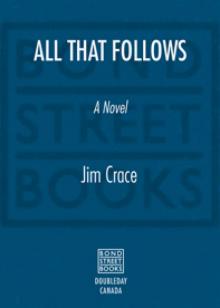 All That Follows
All That Follows Quarantine
Quarantine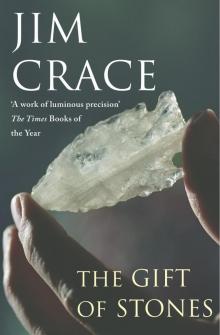 The Gift of Stones
The Gift of Stones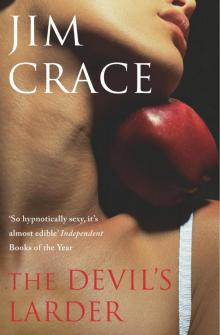 The Devil's Larder
The Devil's Larder Genesis
Genesis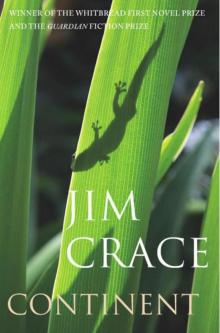 Continent
Continent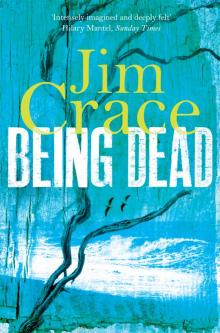 Being Dead
Being Dead Harvest
Harvest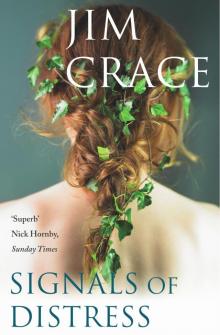 Signals of Distress
Signals of Distress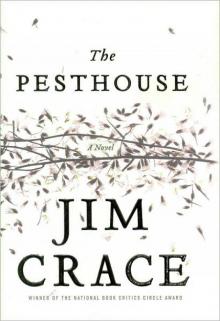 (2007) The Pesthouse
(2007) The Pesthouse